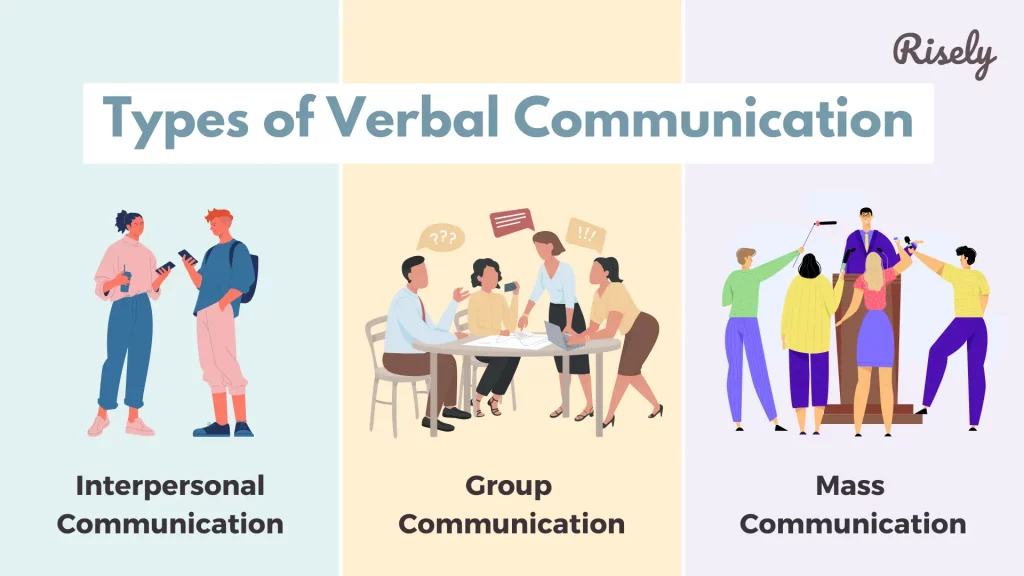How To Improve Verbal Communication In The Workplace? 5 Proven Tips
We talk a lot. To be honest, we do, but without paying much heed to what it’s creating. But words matter – especially at your workplace. Grammarly’s State of Business Communication 2023 report showed that 72% of leaders correlated improved productivity with effective communication. Communication is an essential part of any job. But communication skills required for managers are different from others. One of the most important skills that a manager needs is verbal communication. Managers work with many people, each of whom has their own set of expectations, goals, and requirements. As a manager, your job is to ensure every team member feels supported and heard and that their individual needs are met. Not only that, the knowledge workers surveyed as part of the same study agreed overwhelmingly that effective communication increased work satisfaction (56%), improved relationships with colleagues (54%), and increased productivity (52%). These numbers highlight that communication is no laughing matter! Instead, verbal communication in the workplace is among the key determinants of your success. Let’s read on to discover the various aspects of verbal communication to ace the task.What is Verbal Communication?
Verbal communication skills refer to the ability to communicate effectively through speech. It includes articulating thoughts and ideas clearly, listening actively, and responding appropriately in conversation or presentation. Verbal communication skills also involve using appropriate language, tone, and nonverbal cues such as body language and eye contact. Verbal communication is an integral part of every workplace. It helps employees share ideas, process information, and collaborate. These skills are essential for success in any field – but critical for managers whose effectiveness hinges majorly on communication. Read more: The Top 9 Communication Skills Every Manager NeedsWhat are the Examples of Verbal Communication Around You?
We actively engage in many forms of verbal communication without even noticing. What are they? Let’s have a look at few below:- Meetings and Discussions: Verbal communication is essential for discussing project updates, goals, and team concerns. Your team members verbally share ideas and collaborate to generate creative solutions.
- Client Communication: Professionals verbally communicate with clients to understand their needs, provide advice, and discuss potential solutions. Verbal communication addresses customer inquiries, resolves issues, and provides assistance.
- Feedback and Performance Reviews: Managers provide verbal feedback to employees about their performance, strengths, and areas for improvement. Team members communicate with each other to provide constructive feedback and support professional development.
- Collaboration: Verbal communication is essential for coordinating efforts, sharing information, and ensuring everyone is on the same page. It is the bedrock of discussions about terms, conditions, and agreements between parties.
- Social Interaction: Verbal exchanges during coffee breaks, water cooler conversations, or team outings contribute to building relationships and a positive work environment.
Verbal vs. Nonverbal Communication
Verbal and nonverbal communication are two distinct but interconnected forms of communication. Verbal communication is the use of spoken words to communicate with others. On the other hand, nonverbal communication uses body language, facial expressions, and other gestures. Verbal and nonverbal communication can work together or independently to create a complete picture of what is being said. A team can effectively achieve its goals and success with verbal communication skills. Both verbal and nonverbal communication are important in conveying a complete and accurate message, and they complement each other in human communication.What are the Types of Verbal Communication?

Interpersonal Communication
Interpersonal communication is exchanging messages with others in a one-on-one setting. It allows people to share information, perspectives, and ideas. Interpersonal communication helps you build relationships, resolve conflicts, and achieve goals. In addition, it plays a crucial role in building trust and improving relationships between people of different backgrounds, beliefs, and cultures. Managers often use this to communicate with individual team members, for instance, in one-on-one check-in meetings.Group Communication
Group communication is the process of exchanging messages with others in a group setting. It allows people to share information, perspectives, and ideas with multiple people simultaneously – creating the scope for discussion. Group communication is often used for problem-solving and decision-making. It can also be used to build consensus on decisions or objectives.Mass Communication
Mass communication is the process of exchanging messages with a large number of people at once. It can be used to inform and educate a large audience, build public support for an agenda or cause, promote ideas, or communicate with the whole organization at once.Other Interesting Reads
Why Should You Care About Verbal Communication at Work?
Verbal communication matters a lot at work, especially for managers who must ensure that their team’s productivity is not declining due to miscommunication. In a survey with knowledge workers, research by Grammarly found that miscommunication often paves the way for bigger maladies like absenteeism and turnover. It is often the cause behind multiple issues like heightened stress, decreased job satisfaction, and low confidence. Solid verbal communication will help you shine in many areas:- Expectation and goal-setting: Managers need to communicate their expectations, goals, and feedback effectively to their employees. Verbal communication helps to ensure everyone is on the same page and working towards the same objectives.
- Building relationships: Good verbal communication skills help managers build trust and rapport with their employees, which is essential for effective teamwork and collaboration.
- Conflict resolution: It is an important tool for resolving conflicts and negotiating solutions in the workplace. Managers need to be able to listen to different perspectives, clarify misunderstandings, and find mutually beneficial solutions.
- Motivating employees: Managers can use verbal communication to inspire and motivate their employees. Verbal communication can help employees understand their role in achieving company goals and feel valued and appreciated for their contributions.
- Problem-solving: Managers need to communicate problems effectively and gather input from their team to find the best solution. Verbal communication skills help managers facilitate discussions, ask questions, and negotiate with stakeholders to reach a resolution.
You Might be Talking Instead of Communicating, Here’s Why
Picture this: your colleague, let’s call her Sarah, is right in front of you. Imagine a meeting where Sarah leads a project team with a tight deadline. In a team meeting, she wants to emphasize the urgency of completing specific tasks by a certain date to ensure the overall project stays on track. During the meeting, she said, “We need to get these tasks done soon; it’s crucial for the project. Let’s try to move as quickly as possible.” The room had more than a few bewildered faces. Do you know why? Because there were some issues in the way this information was communicated.- Lack of Clarity: Sarah’s message lacks specific details, such as the exact deadline, priority of tasks, or consequences of delays. Team members are unsure about the urgency and the specific timeframe for completion.
- Assumed Understanding: Sarah believes her team shares her understanding of urgency without explicitly conveying the specific time constraints. However, different team members may interpret “soon” differently, leading to confusion.
- Incomplete Information: Team members are left with incomplete information, making prioritizing tasks or allocating resources challenging. This results in a lack of alignment and coordination within the team.
- Tone: Sarah’s message came fast and without much detail, emphasizing stress and urgency but not showing confidence in the team.
Language differences
Language barriers can impact communication in several ways. For example, they can impair the ability to understand one another fully and accurately, leading to misunderstandings and frustrating interactions. They can also prevent people from communicating effectively when they are trying to resolve a conflict or solve a problem. Hence, managers should use accessible language for their teams to comprehend the messages completely.Physical distance
The distance between people can also impede communication. When people are physically separated from one another, it can be difficult to convey emotions and understand each other’s perspectives. It can lead to misunderstandings and confusion about the intentions of others. While communicating, it would be great if the physical space is considered and adjusted to ensure no barriers are created.Emotional barriers
The emotions of the participants can also impede communication. For example, if one team member is angry and unwilling to listen, it can be challenging for the other person to communicate their message. This often leads to misunderstandings and frustrated employees. Understanding the situation and adapting the message accordingly with the help of emotional competence is crucial in overcoming this.Cultural differences
Cultural differences can also lead to communication barriers. For example, some cultures are more verbal than others and may not use the same language when communicating. Additionally, cultural norms can impact how people communicate, leading to misunderstandings and conflict. The same messages can be interpreted differently due to this. Managers should be aware of these barriers to ensure that their messages are received correctly and without complication.Cognitive biases
People often make cognitive errors when communicating. These errors can result in misinterpretations of the message, leading to conflict and confusion. For example, people may jump to conclusions or assume that others understand their intentions without actually speaking out loud. Managers need to be aware of these common workplace biases and use caution when communicating with their teams.How to Improve Verbal Communication at Work?
Verbal communication, although just one of the many facets, remains essential for managers and workers alike, even when the world is moving toward a hybrid mode, focusing heavily on written communication. It is critical in building relationships, establishing trust, and problem-solving. Here are five things that you should do to improve your verbal communication habits:- Focus on Clarity and Conciseness: Articulate messages using simple language, avoiding jargon and ambiguity. Be concise to ensure the team quickly understands key points.
- Active Listening and Feedback: Actively listen to team members, show interest, and encourage feedback. Create an environment where team members feel comfortable providing input on your communication style.
- Read the Room: Adapt your communication style to different audiences within the team. Practice empathy, acknowledging the perspectives and feelings of team members to build stronger connections.
- Body Language and Timing: Be mindful of body language, maintaining eye contact and open gestures. Consider the timing and pacing of your communication, choosing appropriate moments for discussions.
- Continuous Improvement and Professional Development: Reflect on communication experiences, seek opportunities for improvement, and invest in professional development. Attend courses or workshops to enhance verbal communication skills and stay updated on effective strategies.
Conclusion
Communicating and listening effectively can help you build rapport with people and create a more effective team environment. As a manager, listening is vital. It allows you to understand others’ perspectives, demonstrates your respect for their ideas, and encourages communication. You should also be prepared to ask questions to show interest in the other person’s ideas and feelings. In addition, by learning verbal communication skills, such as speaking clearly and concisely, listening effectively, and using body language appropriately, you can improve your ability to communicate with others in both verbal and nonverbal ways.Test the all-round effectiveness of your communication skills for free
Take the free communication skills self-assessment for managers to reveal your skills now.
Other Related Blogs
Executive Communication Coach: When And How To Choose
Executive Communication Coach: When And How To Choose Good communication is a must for professional success. After all, half of people management is all about saying the right things in…
5 Unique Benefits Of Online Leadership Coaching
5 Unique Benefits Of Online Leadership Coaching Remember the days of leadership development being confined to a stuffy conference room filled with flipcharts and generic advice? Yeah, those days are…
Performance Management Training: Empowering Managers To Manage Better
Performance Management Training: Empowering Managers To Manage Better Remember that feeling of dread when you knew performance review season was rolling around? Yeah, us, too. For many employees, performance reviews…
Manager Development Goals And How To Reach Them: Opportunities And Areas To Focus On
Manager Development Goals And How To Reach Them: Opportunities And Areas To Focus On You’ve meticulously crafted a development program for your high-potential employees, but their managers just aren’t on…


